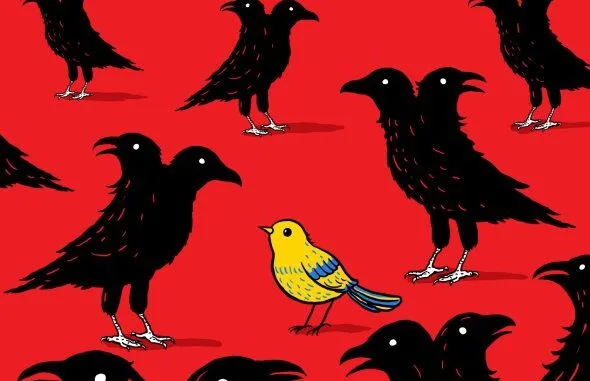Culture is an important aspect in most, if not all, people’s lives. We live in a globalized world where the exchange of cultural experiences is simply unavoidable. Customs, traditions, and so on are necessary for every nation. The problem is when this culture “kills” another and pretends that nothing is happening. In connection with the ongoing invasion of Ukraine, where Russia is the occupier, this is exactly what is happening. When the culture of the aggressor nation – the country that initiates hostilities or invasion – is endorsed without critical engagement, it can lead to the normal promotion of aggression. Therefore, approving the culture of the aggressor nation may normalize aggression.
Exchanging and celebrating other cultures is an act of accepting and promoting the culture of another nation. It was and still is an important aspect of international relations. For example, in the post-World War II era, cultural support often served as a tool of diplomacy. It was a kind of means of soft power and a way to understand and interact together to find understanding between people.
However, the influence of culture and its exchange is not always positive. This is especially relevant in the context of the concept of the “aggressor state.” An “aggressor country” is a country that begins military operations or invasions against other countries, violating international law and norms. It is very important to correctly interpret the meaning of this word. This is not only an acknowledgment of the physical fact of the problem, but also an acknowledgment of the underlying ideology and values that justify such actions.
When the culture of such a nation is endorsed without criticism or context, there is a risk that these ideologies and values, including the normalization of aggression, are also normalized. For example, A study published in the journal “Principles of Social Psychology” has found that cultural factors strongly influence aggression. In cultures where it is socially acceptable or even encouraged to respond to insults with violence (known as a “culture of honor”), even minor conflicts can be perceived as threats to one’s social standing and reputation, as Putin said: “If a fight is unavoidable, you must punch first!”

In the event of a Russian invasion of Ukraine, Russia’s cultural aspects should be considered as a weapon of war. After the Russian invasion of Ukraine, there was an understanding of the extent to which Russian culture played an important role in the war. After the beginning of the invasion, the presence of Russian culture is extremely small in Ukraine and is decreasing every day. Ukrainian society accelerated its efforts to eradicate the remnants of the Russian imperial and Soviet past. Some Russian intellectuals have expressed concern about the attack on Russian culture in Ukraine. Also, in the Western world, I have personally encountered such thoughts many times: “I don’t understand why the Russian flag is not shown at tennis tournaments,” “Sport is not in politics,” “What did Pushkin do to Ukraine,” “What’s the problem with listening to Russian music?” It is important to understand that Russian culture plays one of the key roles in Putin’s imperialist ideas. Russian troops have occupied vast swathes of Ukraine, and Russian President Vladimir Putin proudly claimed the return of “historical Russian lands,” so is it the time to rally to Pushkin’s defense?
Russian culture has become a weapon in Putin’s quest to restore the Russian Empire. Russia is exterminating the Ukrainian people as it did 300, 200, and 100 years ago and does not hide this fact. Plus, the overwhelming physical evidence of war crimes in Ukraine itself is supported by an endless stream of evidence from Russian officials and propagandists in Moscow that demonstrate an unequivocal genocidal intent.
In essence, the Russian government promotes cultural aggression, perpetuating the dominance of one culture over others, which leads to the erasure of Ukrainian traditions and culture. Ensuring that honoring culture does not lead to normalizing aggression or ignoring its victims is important. This, unfortunately, is not seen in most people.
The long-term effects of this normalization of the culture of the aggressor country can have profound and far-reaching consequences, affecting both the people who support the culture and the aggressor countries.
By endorsing the culture of the aggressor, there may be a gradual decrease in sensitivity to the aggressive actions of the aggressor nation. Looking at the permanent symbols of this country (flags, coats of arms, etc.). Listening to music, reading literature, and especially honoring the history of that country can lead to simple habituation to the culture while that culture is being used as a tool of war. As a result, there will be more frequent violations of international norms and the potential perception of similar aggressive behavior in other countries. For an aggressor country, the endorsement of its culture can strengthen its international authority and provide a form of soft power that can be used to further its aggressive actions without facing significant international backlash.
Yes, it can be argued that cultural exchange and mutual understanding are vital for the promotion of international relations and peace. When we support a nation’s culture, we can gain a deeper understanding of its people, history, and values, which can help bridge differences and resolve conflicts. However, it is important to distinguish between the understanding of culture and its biased approval. Through the word “understanding,” we should know that when we recognize all aspects of culture, we also recognize those that can contribute to aggression or conflict. Approving a culture without such critical understanding can lead to the normalization of harmful behaviors and ideologies. That is what happened in the case of Russia with Ukraine.
Many believe that culture and politics should be separated. They argue that the actions of a government do not necessarily reflect the values of its people, and therefore a people’s culture should not be held responsible for the actions of its government. While it is true that the actions of a government do not always reflect the values of its people. It is evident that culture and politics are deeply intertwined. Otherwise, I could understand how eight out of ten Russians approve of Putin’s actions. This shows that the majority of Russians support the policies and actions of the dictator. Which is a direct link between the government’s decisions and the values of its people. We can also consider the centralized decision-making process in Russia, which only allows the government to strengthen this connection even more. Therefore, by celebrating and sharing the culture of the aggressor, we only indirectly allow the actions of this aggressor to be hidden and simultaneously diminish the culture of the victim.
Featured image by Ukrainer







